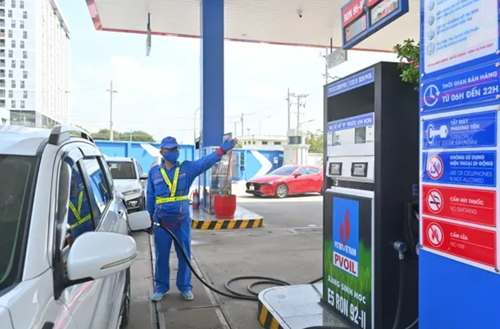The pilot rollout aims to assess consumer acceptance and the technical readiness of Petrolimex’s distribution network, serving as a foundation for potential nationwide expansion, he said.
The Ministry of Industry and Trade (MoIT) is currently developing a roadmap for the nationwide adoption of E10, scheduled to begin on January 1, 2026. This move aligns with the government’s effort to reduce greenhouse gas emissions and fulfil its commitment to achieving net-zero emissions by 2050.
    |
 |
|
Customers refuel with biofuel at Phu Huu petrol station in Ho Chi Minh City. (Photo: SGGP) |
Under national technical regulation QCVN 01:2022/BKHCN, E10 is a finished gasoline product blended with 9-10% bioethanol by volume. In addition to reducing dependence on fossil fuels, E10 offers environmental advantages and improved engine performance.
Researches conducted both domestically and internationally show that ethanol has high oxygen content, which helps improve the combustion process of the fuel mixture. Therefore, E10 gasoline can reduce carbon monoxide (CO) and hydrocarbon (HC) emissions compared to traditional mineral gasoline, which means reducing the risk of air pollution and the greenhouse effect - one of the main causes of global climate change.
E10 is also considered engine-friendly. Studies confirm that E10 is compatible with most gasoline engines, including older models.
More than 60 countries have already adopted E10 fuel. In the U.S. and Europe, the use of biofuel blends is mandated by law. Since 2018, Asian countries like China and the Philippines have fully switched to E10, banning retail sales of unblended fossil gasoline.
At a recent mid-year review of the petroleum market, the MoIT reaffirmed its commitment to boosting biofuel adoption, particularly E10, as a strategic step toward phasing out conventional gasoline and advancing Vietnam’s emission reduction goals.
Advancing green transition
As part of its strategic development vision toward 2035, Petrolimex aims to become Vietnam’s leading energy group in green, clean, and high-quality fuel products, backed by Industry 4.0 technology and comprehensive digital transformation. Biofuel trading plays a central role in this transition.
The group is currently upgrading its retail infrastructure, expanding its ethanol blending capacity, and strengthening partnerships with both domestic and international ethanol producers to ensure a stable and sustainable fuel supply. In addition to E10, Petrolimex is exploring alternative fuels such as hydrogen and other renewables.
According to Nam, successful E10 implementation requires thorough infrastructure and technology preparation, including dedicated ethanol storage and close coordination with refineries. Thus, Petrolimex proposed the MoIT to issue detailed guidance to allow major distributors to plan investments and technical upgrades. It also suggested revising several technical standards to align with international gasoline specifications.
Bui Ngoc Bao, Chairman of the Vietnam Petroleum Association, stressed the need to outline a specific roadmap with at least six months of lead time for businesses to prepare. He also urged early release of a draft decision to replace the Prime Minister's Decision No. 53/2012/QD-TTg, in order to gather public feedbacks and address outdated regulations on fuel quality, market management, and E10 standards.
To support E10 deployment, the MoIT has instructed agencies to introduce a set of measures, including ethanol price subsidies to stabilize supply, finalization of technical standards, enhanced public communication, and expansion of biofuel distribution networks, particularly in rural, mountainous, and island areas.
Source: VNA